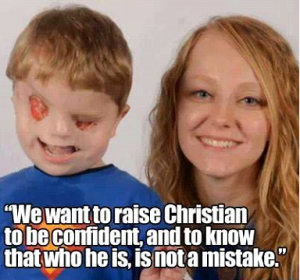Washington DC (LiveActionNews) — “Fetuses aren’t children.” This was the answer I received to my tweet that said, “…Killing children – at any developmental stage – should be illegal.”
The exchange went on:
Me: “Are adolescents children? If children are children at one developmental stage, they’re children at every developmental stage.”
K.K.: “A fetus has none of the abilities/physical characteristics that even a newborn has.”
Me: “Hmmm, really? A baby at 39 wks is still a fetus. You’d really argue that she has none of the characteristics of a newborn?”
K.K.: “She obviously looks, in ultrasounds, like a baby. But she still cannot breathe, move, eat. vocalize like an infant.”
 While I actually enjoy talking with the lady who was debating me, I have to shake my head at this terrible logic. By claiming “fetuses aren’t children,” she was claiming:
While I actually enjoy talking with the lady who was debating me, I have to shake my head at this terrible logic. By claiming “fetuses aren’t children,” she was claiming:
- There is an arbitrary developmental standard humans must meet to become children.
- Having the abilities and physical characteristics of a newborn apparently qualify a human as a child, worthy of protection.
- Looking like a baby is not enough. Unless you can breath, move, eat, and vocalize like an infant, you’re not human enough. And you can be freely killed.
I would propose three different solutions – ones that recognize the dignity and value of all humanity.
1) One Concrete Standard
Instead of manufacturing an arbitrary standard, there is already a simple – and scientifically accurate – concrete standard of when our humanity attaches. When a human first comes into existence, she is human and worthy of protection. (I don’t personally care if you want to call her a child, an infant, a baby, or a zygote. The point is that all of these are stages of human development – just as adolescent, teenager, adult, and elderly are – and there is no “un-valuable” stage of human life.) Nor is there any stage of human life at which we are not human.

2) The Failure of Abilities and Appearance
Ok, let’s think. Typically, newborns can cry, eat, experience pain, realize when their needs are being met, wiggle and squirm and kick, open their eyes, and eliminate waste.
What about newborns who are born with a partial brain, no palate and no ability to eat, a disorder where they can feel no pain, tied intestines and no ability to eliminate their waste, with missing limbs, or fused eyes? Are these newborns not people? Technically, they don’t have the “abilities and physical characteristics of a newborn.” In fact, a 39-week-old fetus (or a 20-week-old one for that matter), more closely resembles a newborn.
And yet, should our “abilities” and “appearance” truly be the standard by which our humanity is measured? While some abortion advocates apparently think so, it is far more humane to say that once your personal, unique human self has come into being, you are human. And if you are human, others ought to treat you with dignity and equality, no matter your appearance or abilities – or lack thereof.
3) You Don’t Have the Right
The core problem is illustrated by my debater’s claim that rights are given once someone can “breathe, move, eat, and vocalize like an infant.” Another woman I debated claimed the standard was “living and breathing and walking around like you and I are.” While our society often doesn’t like to admit that there can be one right standard, when it comes to human life, there is.
You don’t have the right to say someone must be able to walk to have the right to life. You don’t have the right to say that someone must be able to vocalize to have the right to life. You don’t have the right to say that someone must be able to breathe or eat or move to have the right to life. And you don’t have the right to say someone must be aware of their surroundings or recognize their place in this world or understand their needs or desires or emotions to have the right to life. There is only one logical standard for a civilized society.
Every single human life, at every single stage of development, deserves the equal right to life. It really is that simple.
LifeNews Note: Kristi Burton Brown is a pro-life attorney, volunteering for Life Legal Defense Foundation and as an allied attorney for Alliance Defending Freedom. She is also a stay-at-home mom and an assistant editor for Live Action News. This column originally appeared at Live Action News and is reprinted with permission.







